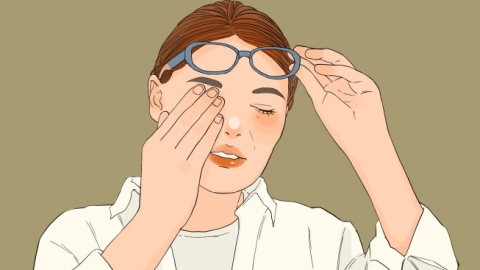What causes eye pain?
Generally, eye pain may be caused by factors such as eye strain, foreign bodies entering the eye, conjunctivitis, keratitis, glaucoma, and others. It is recommended to seek timely medical attention, identify the underlying cause, and undergo appropriate treatment under a doctor's guidance. A detailed analysis is as follows:

1. Eye strain: Prolonged screen watching or reading can cause tension in the eye muscles and fatigue in the ciliary muscles, leading to soreness and pain in the eyes. Rest your eyes for 5-10 minutes every 40 minutes of eye use, look into the distance to relax the eyes, or perform eye exercises to massage the periorbital muscles. Adjust screen brightness and distance to reduce eye strain.
2. Foreign bodies in the eye: Dust, sand particles, or other foreign substances entering the eye may rub against the cornea or conjunctiva, causing eye pain and tearing. Avoid rubbing your eyes with your hands; instead, gently blink to promote tear secretion and attempt to flush out the foreign body. If the foreign body cannot be naturally expelled, a doctor should remove it using specialized tools to prevent damage to ocular tissues.
3. Conjunctivitis: Inflammation of the conjunctiva may be caused by bacterial or viral infections or allergic reactions, presenting as redness, pain, and increased secretions in the eye. Patients with bacterial conjunctivitis may follow medical advice to use medications such as levofloxacin eye drops, tobramycin eye drops, or chloramphenicol eye drops. Viral conjunctivitis may be treated with acyclovir eye drops, while allergic conjunctivitis requires antiallergy eye drops.
4. Keratitis: Inflammation of the cornea may be caused by infection or injury, resulting in significant eye pain accompanied by photophobia and vision loss. Patients should follow medical advice to use medications such as ofloxacin ophthalmic gel, ganciclovir ophthalmic gel, or pranoprofen eye drops to control inflammation and prevent further corneal damage.
5. Glaucoma: A sudden increase in intraocular pressure compresses the optic nerve, causing severe eye pain accompanied by headache and blurred vision. Patients should immediately follow medical advice to use medications such as brinzolamide eye drops, timolol maleate eye drops, or pilocarpine nitrate eye drops to lower intraocular pressure.
In daily life, maintain good eye hygiene, avoid rubbing your eyes with dirty hands, and wear sunglasses when outdoors to protect your eyes from wind, sand, and strong sunlight. In terms of diet, appropriately supplement with vitamin A and lutein, such as from carrots, blueberries, and other foods, which help maintain eye health.








